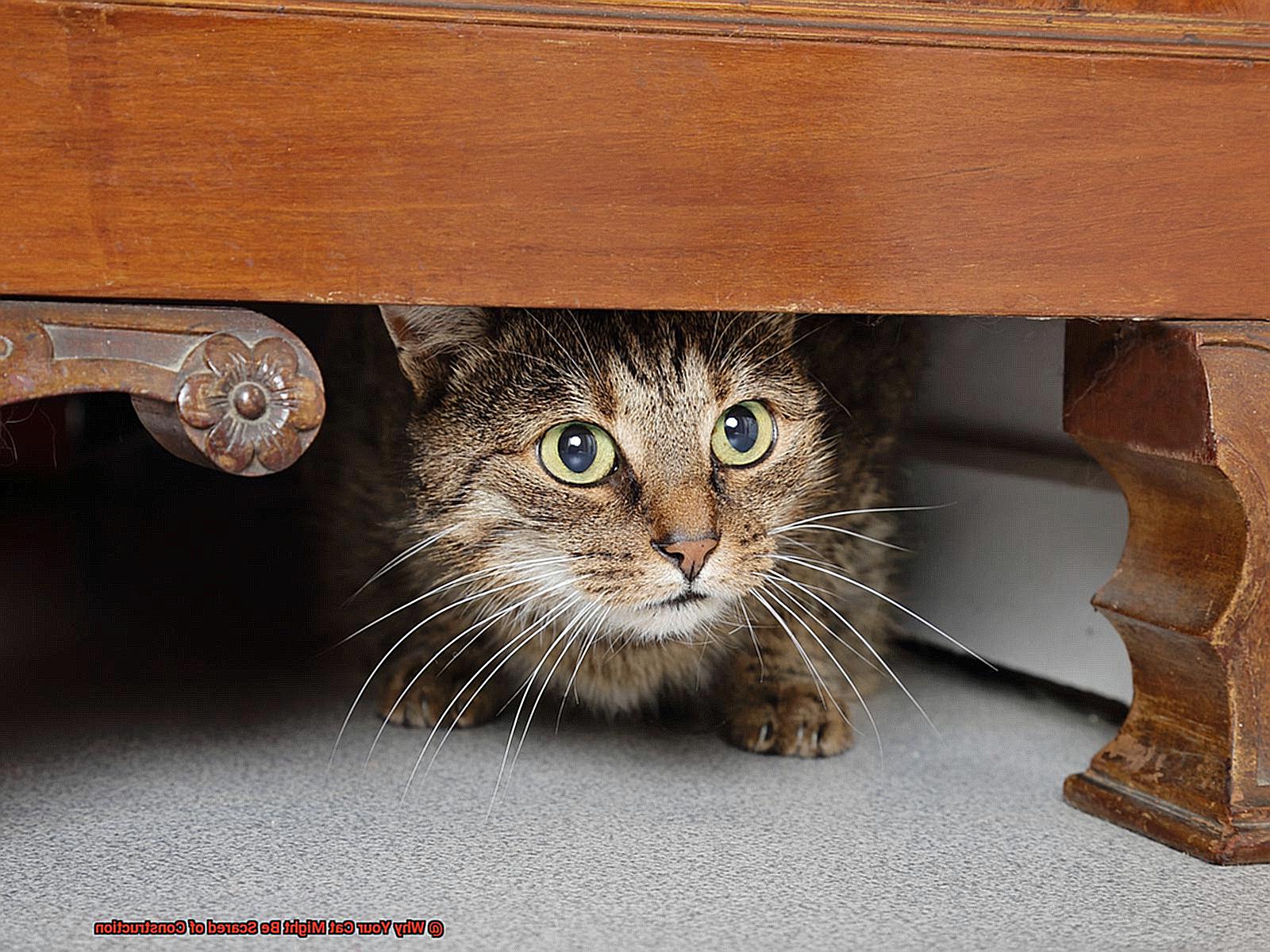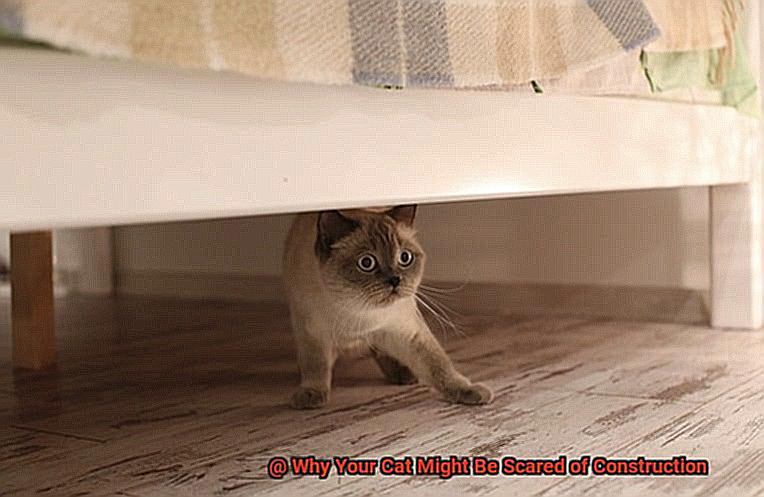Does your cat seem anxious when construction is taking place nearby? Are loud noises from outside making them hide under the bed or cower in a corner? If so, they may be scared of buildings. In this blog post, we’ll explore why cats are afraid of construction and what you can do to help them feel more secure.
From understanding the source of their fear to providing a safe space, we’ll discuss the steps you can take to ease your pet’s anxiety.
So if your beloved cat is struggling with this issue, keep reading to learn more about why cats are afraid of buildings and how you can offer support.
What Causes Cats to be Afraid?
Cats can be easily startled and scared by loud noises, unfamiliar smells, or changes in their environment. Common causes of fear in cats include construction noise, strange people or animals, shifts in routine, and unfamiliar places. Cats may also become frightened by sudden movements or loud voices.
Fear can also be triggered by a traumatic event such as being attacked by another animal or being involved in an accident.

Another cause of fear is a lack of socialization, which can make it hard for cats to cope with new situations and environments.
It’s important to remember that fear is a natural reaction for cats and should not be ignored or punished. If your cat is afraid, create a secure environment where they can relax and feel safe.
If the phobia persists or you need help understanding why your cat is afraid, consult your vet.
How Construction Noise Can Affect Your Cat’s Behavior
Construction noise can be a real problem for cats, especially if they’re not used to it. It’s loud, overwhelming, and even frightening.
When cats hear hammering, sawing, drilling, and other construction sounds, they can become anxious or scared and may try to hide or flee the area. Signs of distress may also be present, such as panting, an increased heart rate, shaking, and meowing loudly.
In some cases, cats may even display aggression by hissing and growling.
It’s important to remember that cats are incredibly sensitive creatures and can easily be overwhelmed by loud noises. To help your cat cope with construction noise, you should give them a safe place to retreat to if they become afraid or stressed out.
Make sure they have plenty of food and water so they don’t have to go looking for it in the midst of the commotion.
To help them relax while the renovations are ongoing, you might also try playing relaxing music or using pheromone diffusers.

Taking these steps will help ensure that your cat is safe and stress-free during the building process. Loud noises can be particularly distressing for cats, so it is important to take extra precaution when building near your house.
Signs Your Cat Is Terrified of Construction Noise
Construction noise can be a frightening experience for cats, and it’s important to know the signs that your cat is scared of the noise.
If your cat is afraid, they may hide in dark places or under furniture for safety, vocalize more often than usual with meows, yowls, and hisses, become aggressive towards people or other animals in the home, lose their appetite, urinate and defecate outside of the litter box, and groom themselves excessively as a way to cope with their emotions.
If you notice any of these signs in your cat when they hear construction noise around them, it’s essential to provide a safe environment so they can feel secure and calm.
This could include blocking off certain areas of the house from construction noise or providing them with a quiet space where they can retreat to when feeling anxious.
It may also help to talk to your vet about calming medications or supplements that can help reduce your cat’s anxiety.
Ways to Reduce Stress and Anxiety in Your Cat
Cats are beloved companions, but stress and anxiety can sometimes plague them. If your cat is feeling tense, there are a few steps you can take to help reduce their stress levels.
First, create a safe and secure home for your cat. Make sure the area is free of loud noises and other stimuli that may cause stress. Provide plenty of hiding spots, like furniture or boxes, for your cat to feel secure.
Second, introduce calming scents into the environment. Lavender and chamomile are two popular options that can help reduce anxiety in cats. Play soothing music or white noise to drown out any construction noises that may be bothering your cat.
Provide plenty of toys and scratching posts for your cat to play with. This will divert their attention away from the construction noise and keep them occupied throughout the day.
Finally, spend quality time with your cat every day so they know they are loved and cared about. This will help lower their anxiety levels and make them feel more secure in their environment.
Keeping Your Cat Calm During Construction
Construction can be a stressful time for cats, with loud noises and unfamiliar faces making them feel overwhelmed and scared. To ensure your cat’s safety during this period, there are a few things you can do to help keep them calm.
Provide your cat with a comfortable, safe place to hide away from the chaos of construction.
This could be their favorite spot in the house or a special hideaway just for them.
Playing calming music or white noise can also drown out some of the loud noises and make them feel more relaxed.
Feliway pheromone diffusers are also known to help cats feel more at ease during stressful situations.
It’s important to give your cat plenty of love and attention during this time, as well as ensuring they have access to food and water. If you’re worried about your cat’s anxiety levels, talk to your vet about medications or supplements that may help in the short term.
Tips for Helping Your Cat Cope with Construction Noise
Construction noise can be a stressful and disruptive experience for cats. If your house is undergoing renovation, here are seven tips to help your cat cope with the noise.
- Provide a safe and comfortable place for your cat to take refuge during construction. This could be a room, a closet, or even a pet carrier. Make sure all windows are closed or covered with thick curtains to block out the sound of construction as much as possible.
- Play soothing music or white noise to help drown out the construction noise. Classical music or other calming tunes may help keep them relaxed and less anxious about the sounds outside.
- Talk to your cat in a calm and reassuring voice to help them feel safe and secure in the midst of turmoil.
- Give your cat extra attention and affection during this time of stress.
- Increase environmental enrichment activities for your cat, such as interactive toys, puzzle feeders, and scratching posts, to keep them busy and distracted from the noise outside.
- Use soundproofing materials, such as insulation or heavy curtains, if possible, to reduce the amount of noise coming in from outside.
- Consider using pheromone diffusers such as Feliway or Adaptil to help reduce stress levels in cats during times of loud noises, like construction work outside the home. Pheromones are natural chemicals that cats release when they feel safe and secure, so spreading them around your house can help keep your cat happy during construction periods.
Creating a Safe Place for Your Cat During Construction
Construction can be a stressful time for cats, so it’s important to create a safe and secure area away from the noise. Ensure this space is warm and dry, as cats love to feel safe and secure.
To keep your feline friend distracted from the chaos, provide plenty of toys and treats. You may also want to consider using calming products such as Feliway or Rescue Remedy to help ease their anxiety.
If possible, provide a space where your cat can hide when feeling overwhelmed by the noise. If you’re concerned about your cat’s fear of construction noise, talk to your vet for advice.
Conclusion
Construction can be a terrifying experience for cats, but with the right care and attention, they can learn to cope.
To reduce your cat’s anxiety and fear, provide a safe, secure environment; introduce calming scents; play soothing music or white noise; and give them plenty of love.
Additionally, consult your veterinarian about medications or supplements that may help reduce stress during construction times.







